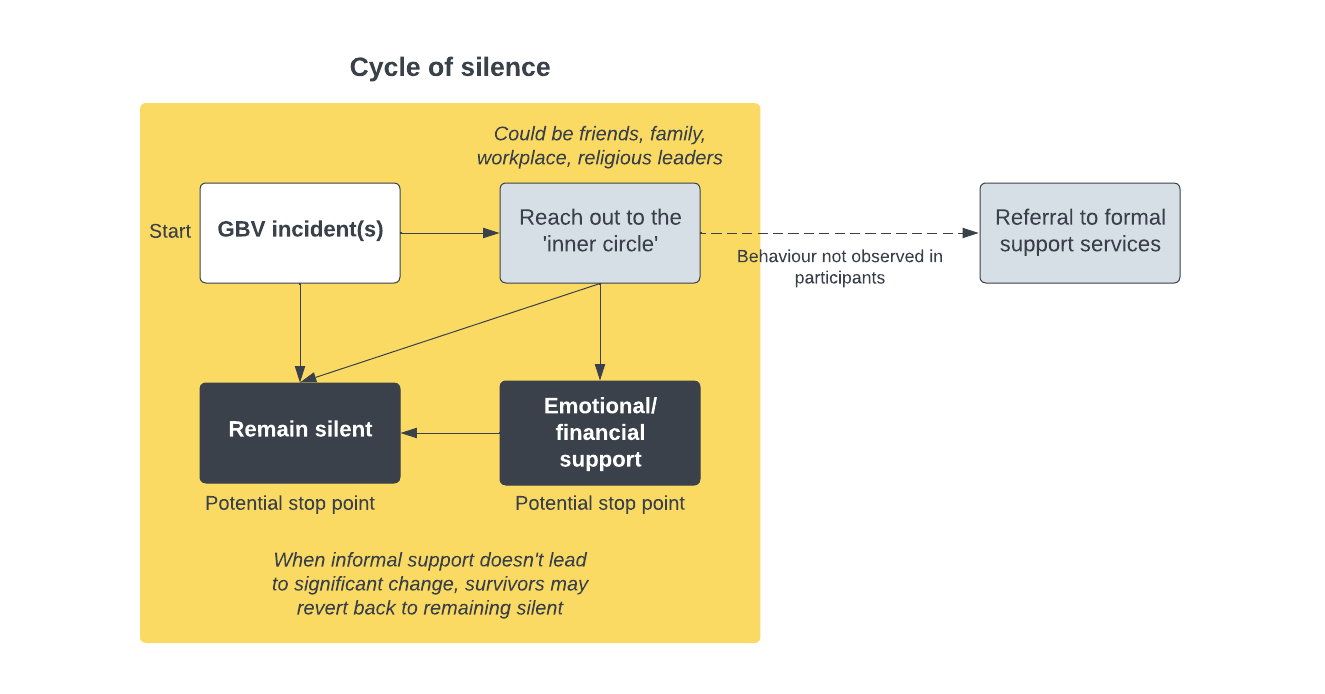Behavioural insights have an important role to play in combating gender-based violence (GBV). BIT has worked on various projects to tackle GBV around the world. We have designed advertisements to encourage survivors to seek support in Honduras and El Salvador, developed messaging to encourage bystanders to engage with prevention resources in Georgia and South Africa, and engaged men as allies in preventing GBV in Bolivia and Guatemala.
Having extensive experience with interventions to tackle GBV, however, does not mean that we can assume all solutions successful in the past will be applicable in a new setting. Context matters. We know from the behavioural sciences that small environmental factors can have big impacts, and the behavioural environment for GBV is fundamentally different around the world. While looking at past projects and the existing literature can give us some indication of what might work, it is an incomplete picture without rigorous research from the ground—which is exactly what we did in our recent project with the United Nations Development Programme (UNDP) to tackle GBV in Indonesia.
Conducting rigorous research to adapt our interventions
One in three women in Indonesia have experienced violence by an intimate male partner during their lifetime. To promote gender justice in Indonesia, we worked with independent researchers affiliated with UNDP Indonesia who conducted immersion research with GBV survivors. Immersion is a qualitative research approach that enables unmediated conversations, observations, and experiences with individuals in their natural environment and at their convenience, which ultimately produces rich data. The research aimed to capture GBV survivors’ perspectives and experiences in help-seeking while prioritising their well-being and safety.
The immersion research findings shaped our behaviourally-informed solution design in two ways:
First, the research findings informed the choice of intervention. Our research found that survivors underutilised formal support services due to low awareness of their existence — most sought informal support from their friends and family (their “inner circle”) as their first point of call. If their inner circle provides inadequate support, however, survivors may return to a “cycle of silence” where they endure GBV silently (see figure below). Yet, in the Greater Jakarta area, there are a variety of formal support services available that are free at the point of care. Therefore, we designed a simple social media campaign, targeted at the inner circle of GBV survivors, to increase the uptake of free, formal support services in the Greater Jakarta Area. 
The cycle of silence: Many women end up remaining silent and staying in their situations after an incident of violence, even if they reached out to trusted friends and/or family.
Second, the research findings also informed the content of our intervention. The messaging used in our advertisements aimed to address behavioural barriers we identified: low awareness of what constitutes GBV and formal support services, low perceived capability in addressing GBV challenges, uncertainty aversion, and negative social influences. For example, we found from the immersion research that GBV survivors tended to follow female role models in their lives—survivors whose mothers endured GBV also chose to endure GBV (a negative social influence), whilst the survivors who broke out of their situations had sisters or mothers who did not tolerate GBV. To help GBV survivors and their inner circle understand that it is possible to break out of the cycle of silence, one of our advertisements (the “Role model” ad) included an excerpt from a survivor who recounted how her sister brought her to the hospital, which gave her hope for the future after her predicament.
Below are the three ads that we designed to address the identified behavioural barriers. All ads had been designed based on behavioural insights that had worked to increase help-seeking in past trials.
Finding the most effective intervention
We tested these advertisements by running a four-arm randomised control trial among 1 million female Instagram users in the Greater Jakarta area. We compared our behaviourally-informed ads against a control ad, which addressed low awareness barriers by providing information on the prevalence of GBV and options for formal support services.
Our control ad. English: 1 in 3 women in Indonesia have experienced GBV before. Let’s take action.
We found that only the “Role model” ad encouraged more people to click the “Send message” button under the ad by a statistically significant amount. This ad led to 228 users showing interest in getting information about support services, an additional 76 users compared to the Control condition.
*** significant at p<0.001 * significant at p<0.05
** significant at p<0.01 + significant at p<0.1
The results show the importance of an evidence-based approach to improving GBV outcomes such as help-seeking. As our recent Manifesto for Applying Behavioural Science points out, we cannot just “pluck an idea from a generic ‘nudge store’ that we have” and expect it to work in a new setting. Conducting rigorous empirical research, by speaking to and observing the people whose behaviour we want to change, is the key to building solutions that can really help.
If you are interested to know more about the project we did in Indonesia, read our full report linked at bottom of this page. BIT is committed to using evidence and behavioural science to tackle complex development challenges such as GBV. If you are interested in working with us in this space, please reach out to us here.
This project would not have been possible without funding from the UNDP Bangkok Regional Hub. We would like to thank the Tarakan Regional General Hospital (RSUD Tarakan) for their collaboration on the Instagram ad campaign and UNDP Indonesia for their collaboration and efforts throughout the project.
We extend our appreciation to Yulia Sugandi and Nihandini Santi for their valuable contributions as co-authors of our report.











